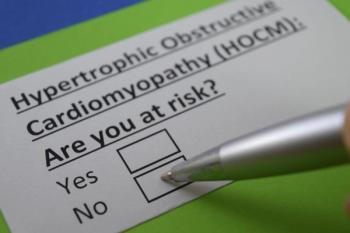
Study Shows Comparative Risks for DOACs
Apixaban (Eliquis) had the lowest overall risks out of direct oral anticoagulants (DOACs) versus warfarin (Coumadin) in a large study.
Researchers at the University of Nottingham in the United Kingdom set out to investigate the associations between DOACs and risks of bleeding, ischemic stroke, venous thromboembolism, and all-cause mortality compared with warfarin, in the
Using two UK primary care databases-QResearch and Clinical Practice Research Datalink (CPRD) -the researchers evaluated 132,231 patients taking warfarin, 7,744 on dabigatran, 37,863 on rivaroxaban, and 18,223 on apixaban without anticoagulant prescriptions for twelve months before study entry. The patients were subgrouped into 103,270 with atrial fibrillation (AF) and 92,791 without AF.
Apixaban was found to be the safest drug, with reduced risks of major, intracranial, and gastrointestinal bleeding compared with warfarin, the researchers state.
“Anticoagulants are prescribed for a wide range of indications although the adverse events have been studied mostly in patients with atrial fibrillation. Our study has shown that the risk of major bleeding is lower in patients taking apixaban-regardless of the reason for prescribing,” writes Yana Vinogradova, PhD, research statistician in the School of Medicine at the University of Nottingham.
In patients with atrial fibrillation, apixaban was associated with a lower risk of major bleed than warfarin and rivaroxaban (Xarelto). Dabigatran (Pradaxa) and apixaban were associated with lower risks of intracranial bleed than warfarin, and rivaroxaban was associated with a higher risk of intracranial bleeding compared to apixaban.
In the subgroup of patients without AF, apixaban was associated with lower risks of major bleed (adjusted hazard ratio 0.60) than warfarin or rivaroxaban. Rivaroxaban was associated with a lower risk of intracranial bleed (0.54) compared with warfarin, and apixaban use resulted in lower risks of all gastrointestinal (0.55) and upper gastrointestinal bleeds (0.55).
The risk of primary ischemic stroke did not differ between any of the anticoagulants studied. In addition, the risk of primary venous thromboembolism in patients with AF was not different between any drugs. However, in the group without AF compared with warfarin, there was a higher risk in patients taking rivaroxaban and lower risks in patients taking dabigatran.
For both patients with and without AF, the risk of mortality was increased in patients taking rivaroxaban compared with warfarin, the researchers find. “Both rivaroxaban and low-dose apixaban were associated with increased risks of all-cause mortality compared with warfarin,” they write.
An important limitation of the study is the lack of information on patient adherence to their prescribed drugs, according to Vinogradova. “It is not known when exactly a patient stopped taking anticoagulants … Warfarin has been shown to have the highest non-persistence [adherence rate] and apixaban and rivaroxaban the lowest.”
Newsletter
Pharmacy practice is always changing. Stay ahead of the curve with the Drug Topics newsletter and get the latest drug information, industry trends, and patient care tips.























